
Economics is a social science that studies the production, distribution, and consumption of goods and services.

Pessimism is a mental attitude in which an undesirable outcome is anticipated from a given situation. Pessimists tend to focus on the negatives of life in general. A common question asked to test for pessimism is "Is the glass half empty or half full?"; in this situation, a pessimist is said to see the glass as half empty, or in extreme cases completely empty, while an optimist is said to see the glass as half full. Throughout history, the pessimistic disposition has had effects on all major areas of thinking.
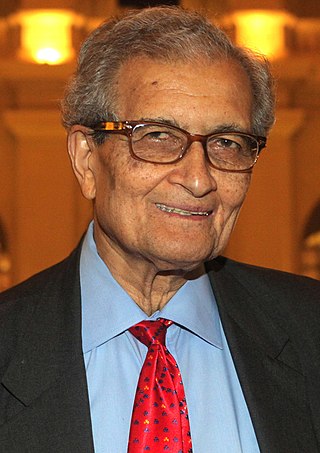
Amartya Kumar Sen is an Indian economist and philosopher, who since 1972 has taught and worked in the United Kingdom and the United States. Sen has made contributions to welfare economics, social choice theory, economic and social justice, economic theories of famines, decision theory, development economics, public health, and measures of well-being of countries.
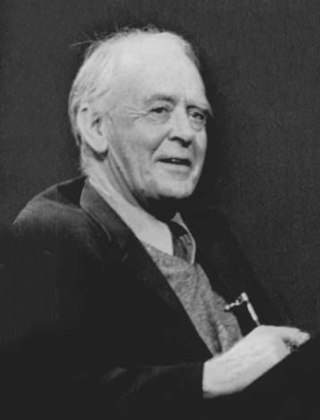
Sir John Richards Hicks was a British economist. He is considered one of the most important and influential economists of the twentieth century. The most familiar of his many contributions in the field of economics were his statement of consumer demand theory in microeconomics, and the IS–LM model (1937), which summarised a Keynesian view of macroeconomics. His book Value and Capital (1939) significantly extended general-equilibrium and value theory. The compensated demand function is named the Hicksian demand function in memory of him.
Normative economics is the part of economics that deals with normative statements. It focuses on the idea of fairness and what the outcome of the economy or goals of public policy ought to be.

Herman Edward Daly was an American ecological and Georgist economist and professor at the School of Public Policy of University of Maryland, College Park in the United States, best known for his time as a senior economist at the World Bank from 1988 to 1994. In 1996, he was awarded the Right Livelihood Award for "defining a path of ecological economics that integrates the key elements of ethics, quality of life, environment and community."

Bruno S. Frey is a Swiss economist and visiting professor for Political Economy at the University of Basel. Frey's research topics include Political economy and Happiness economics, with his published work including concepts derived from Psychology, Sociology, Jurisprudence, History, Arts, and Theology.
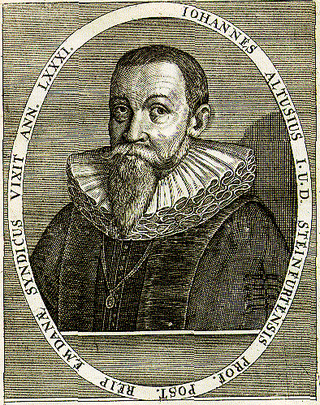
Johannes Althusius was a German jurist and Calvinist political philosopher.

Robert Underwood Ayres is an American-born physicist and economist. His career has focused on the application of physical ideas, especially the laws of thermodynamics, to economics; a long-standing pioneering interest in material flows and transformations —a concept which he originated. His most recent work challenges the widely held economic theory of growth.

The capability approach is a normative approach to human welfare that concentrates on the actual capability of persons to achieve lives they value rather than solely having a right or freedom to do so. It was conceived in the 1980s as an alternative approach to welfare economics. In this approach, Amartya Sen and Martha Nussbaum combine a range of ideas that were previously excluded from traditional approaches to welfare economics. The core focus of the capability approach is improving access to the tools people use to live a fulfilling life.

Nicholas Georgescu-Roegen was a Romanian mathematician, statistician and economist. He is best known today for his 1971 magnum opus The Entropy Law and the Economic Process, in which he argued that all natural resources are irreversibly degraded when put to use in economic activity. A progenitor and a paradigm founder in economics, Georgescu-Roegen's work was decisive for the establishing of ecological economics as an independent academic sub-discipline in economics.
Clement Allan Tisdell was an Australian economist and Emeritus Professor at the University of Queensland. He was best known for his work in environmental and ecological economics.

Thermoeconomics, also referred to as biophysical economics, is a school of heterodox economics that applies the laws of statistical mechanics to economic theory. Thermoeconomics can be thought of as the statistical physics of economic value and is a subfield of econophysics.
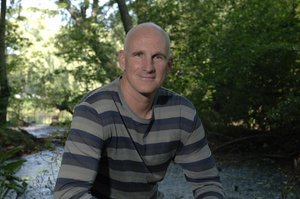
Cutler J. Cleveland is an author, consultant, academic, and business executive. His research primarily involves natural resources, energy use, and their related economies. Dr. Cleveland is the editor-in-chief of the Encyclopedia of Energy and winner of an American Library Association award. He is also the founding editor-in-chief of the Digital Universe Encyclopedia of Earth.
Degrowth or post-growth economics is an academic and social movement critical of the concept of growth in gross domestic product as a measure of human and economic development. Degrowth theory is based on ideas and research from a multitude of disciplines such as economics, economic anthropology, ecological economics, environmental sciences and development studies. It argues that the unitary focus of modern capitalism on growth, in terms of monetary value of aggregate goods and services, causes widespread ecological damage and is not necessary for the further increase of human living standards. Degrowth theory has been met with both academic acclaim and considerable criticism.
Richard M. Goodwin was an American mathematician and economist.
Social preferences describe the human tendency to not only care about one's own material payoff, but also the reference group's payoff or/and the intention that leads to the payoff. Social preferences are studied extensively in behavioral and experimental economics and social psychology. Types of social preferences include altruism, fairness, reciprocity, and inequity aversion. The field of economics originally assumed that humans were rational economic actors, and as it became apparent that this was not the case, the field began to change. The research of social preferences in economics started with lab experiments in 1980, where experimental economists found subjects' behavior deviated systematically from self-interest behavior in economic games such as ultimatum game and dictator game. These experimental findings then inspired various new economic models to characterize agent's altruism, fairness and reciprocity concern between 1990 and 2010. More recently, there are growing amounts of field experiments that study the shaping of social preference and its applications throughout society.
Mauro Bonaiuti, PhD, teaches Ecological economics on the Master's on Socio-Environmental Sustainability and Solidarity Economy and Sustainability programme at the University of Turin. He is co-founder of the Italian Degrowth Association and among the promoters of the Italian Solidarity Economy Network.
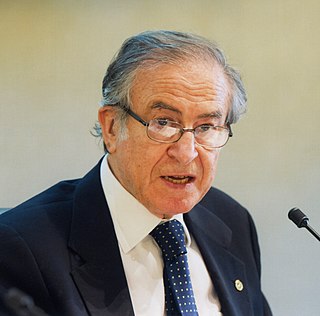
Alberto Quadrio Curzio is an Italian economist. He is Professor Emeritus of Political Economy at Università Cattolica del Sacro Cuore, Milan, President Emeritus of the Accademia Nazionale dei Lincei and President of the International Balzan Foundation "Prize".
Alessandra Smerilli, F.M.A. is an Italian economist, academic, and Catholic religious sister. She has a post-PhD degree in political economy and statistics, obtained from the Pontifical Faculty of Educational Sciences Auxilium.










